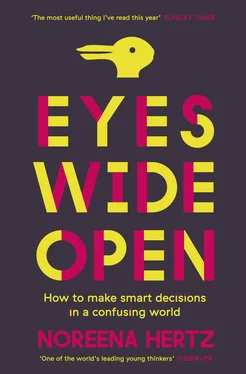This offers a huge opportunity to us as decision-makers. But the question of what, among all the data swirling around the digital landscape, we should give credence to is not straightforward to answer.
In London in August 2011, huge numbers of people rioted, and parts of the city went up in flames. Shops were emptied of expensive trainers and wide-screen TVs. The police looked on powerlessly.
It wasn’t that there was no information. Tuned in to social media, police command centres were overwhelmed by the 2.6 million riot-related tweets that circulated during the five days of rioting.9
The tales circulating the Twittersphere were plentiful and varied – from the political to something more akin to a child’s picture-book: rioters breaking into a branch of McDonald’s to cook their own food, the London Eye being set on fire, a tiger being set free from London Zoo.
The problem was, in the face of so much information, how could the police work out which stories to trust and which to reject? Which leads should manpower be assigned to investigate? Which should be ignored?
All of those tweets mentioned above turned out to be false, by the way.
In the age of data deluge, with information so fractured and diffuse, and arising from so many disparate sources, how do we know what to believe and what to reject, so we are able to benefit from the digital dividend? That is a challenge that this book will address.
Drip, Drip, Drip, Ping, Ding, Ring
Add to the barrage of data another twenty-first-century form of Chinese water torture – the drip, drip, drip of ‘Continuous Disruption’ – and you’ll be better able to understand the demanding context within which we make our decisions.
In this regard, email is Mental Enemy No. 1. The constant pinging, window signalling or green light blinking, depending which medium it finds you on.
Some saw it coming, saw the inherent problem of a medium which could so easily get out of control.
In 1984, just as email was beginning to enter the mainstream, Jacob Palme, a computer scientist from the QZ Computer Centre at the University of Stockholm with a sideline in writing crime novels, warned that ‘electronic mail system, if used by many people, causes severe information overload problems’.
The cause of this problem [Palme wrote] is that it is so easy to send a message to a large number of people, and that systems are often designed to give the sender too much control of the communication process, and the receiver too little control … In the future, when we get larger and larger message systems, and these systems get more and more interconnected, this will be a problem for almost all users of these systems.10
And so it was that Palme’s prophecy came to be. This is an age of cc and bcc. With the click of a mouse you can send an email to everyone you know. Time and again we find ourselves giving people information they really don’t need. In 2012, more than 204 million emails were sent every minute of every day.11
How many emails do you receive each day? What are all these messages doing to your ability to concentrate, to think, to plan, to decide?
And that’s just emails. Add to this the constant droning background noise of open-plan offices, the rat-a-tat-tat of mobile phones, texts, instant messages, Skype calls, phone calls, the lure of websites demanding your attention, and you’ll start to get the picture. These days, we spend three-quarters of our waking lives receiving information.12 Henry Kissinger built a soundproof office above his garage in which to work, banning his wife or children from entering while he was thinking.13 But most of us can’t physically absent ourselves when we’ve got decisions to make. Instead we have to operate in a state of nothing less than continuous and relentless interruption.
On average, computer users change windows, and check email or another program, thirty-seven times an hour.14 Forty-three per cent of college students say they are interrupted by social media three or more times an hour while they are working.15 And when someone’s trying to reach us nowadays, not only will they email us – they’ll text us, tweet us, phone and voicemail us too. Often it can feel that there is no escape.16
The relentlessness of this bombardment has an impact. A Microsoft Research study which tracked over two thousand hours of employee computer activity found that once distracted by an email alert, computer users take an average of twenty-two minutes to return to the suspended task with the same level of focus.17 In 27 per cent of cases, it took them more than two hours to return to the task they were doing in the first place.18 More recent studies have revealed that tasks take a third longer when interrupted by email.19 Whilst a study of employees at the communications firm Porter-Novelli suggested that the combined effect of incessant phone calls and emails can lead to a temporary drop in our IQ of an extraordinary and disturbing ten points.20
As for open-plan offices, the constant background buzz of other colleagues and office equipment makes us 66 per cent less productive.21 Phones ringing on desks, the background hum of conversations we are not part of, and the chime of emails arriving in our inbox distract and demotivate us at work.22
The drip, drip, drip doesn’t just make us less able to think, it’s also exhausting us. We are spent. Unable to sleep, headaches ever looming, always tired; our bodies cope with these new demands by keeping us, as we will learn, in a constant state of hormone-induced stress.23
Yet we crave these interruptions like catnip. Despite their pernicious impact, we actively seek them out. Forty per cent of people continue to check their work email after hours or while they are on holiday.24 Eighty-six per cent of us use our mobiles while watching TV (this figure rises to 92 per cent for the 13-to-24 age group25). An informal poll of friends reveals a geneticist who checks news sites every five minutes while at work, a TV executive who catches up on his emails on the phone while he’s on the stationary bike at the gym, an art dealer who logs on to the Daily Mail website sixty times a day.
We are addicted,26 stressed and overwhelmed, and it’s often while we are in this state that big as well as small decisions have to be made.
Whether we can be switched on if we remain switched on is a question I will return to.
Alongside the constant distraction and the drip, drip, drip of the deluge, the third defining characteristic of our times, the triple of the triple whammy, is disorder – a combination of the breakdown of old, established orders and the extremely unpredictable nature of our age.
For this is an age in which accepted wisdoms have been dramatically overturned. An era in which Lehman Brothers – a bank that was ‘too big to fail’ – proved to be expendable. A time when, rather than preventing women from getting sick, it turns out that regular screening for breast cancer may actually make them sicker.27
An era when certainties can no longer be presumed certain.
Who would have thought, ten years ago, that serious conversations would be taking place about the Chinese yuan replacing the US dollar as the world’s main reserve currency? That a Eurozone country – Cyprus – would impose draconian capital controls? Or that, closer to home, we might no longer be able to trust in the safety of investing in bricks and mortar?
Things we thought we could rely upon now seem ever more vulnerable and chimerical.
Moreover, those who we depended upon to translate and curate the old world order for us have, in just a few years, lost their monopoly of knowledge. Librarians are being usurped by Google, travel agents by TripAdvisor reviewers. Doctors are being challenged by the shared experiences of patients. Grey-haired newspaper proprietors by twenty-something social-media moguls.
Читать дальше












